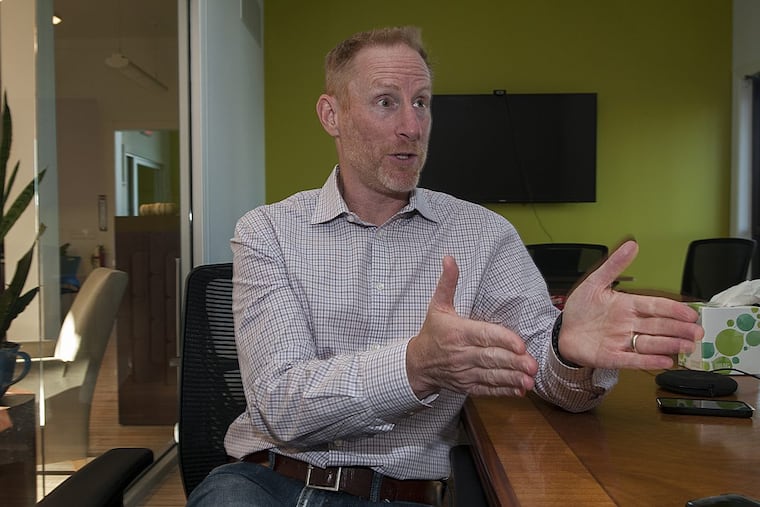B Lab co-founder Jay Coen Gilbert links profits, people
Put away that granola bar. As much as Jay Coen Gilbert, co-founder of B Lab, believes in sustainability, good employment and good environmental practices as key business values, he's all about profit and return on investment.

Put away that granola bar. As much as Jay Coen Gilbert, co-founder of B Lab, believes in sustainability, good employment, and good environmental practices as key business values, he's all about profit and ROI, return on investment.
"Corporations have to compete in the real world, in the real marketplace," said Coen Gilbert, 50. "And if you're bringing in capital, you have to bring in a reasonable return for your investors or you're not going to get any capital."
Spoken like a true businessman, which is what he is. Coen Gilbert co-founded and sold AND 1, a $250 million basketball footwear and apparel company based outside Philadelphia before co-founding B Lab. Based in Berwyn, B Lab certifies companies that adopt and prove that they follow a rigorous set of standards involving pay, good environmental citizenship, and sustainability.
Think of B Corporation certification as being like the "fair trade" label on your favorite brand of coffee.
"What is the difference in the behavior of the company — and therefore its impact on people and community when their investors expect a reasonable return, versus when their investors expect a maximal return? I think there's a pretty big difference," Coen said. "It's not to say they don't make profits. It doesn't mean don't pay them a reasonable return. But it probably also means that somewhere there's money that they can use to actually pay people a living wage and make sure you're not pumping effluent into the river."
Jay, this sounds awfully kumbaya. Is there any legal underpinning to this?
The legal foundation upon which a business, and capitalism, is built has a system-design flaw called shareholder primacy. That means that the only person a CEO can think about when making decisions is the shareholder. Your job is to maximize their returns. It doesn't make you a bad person to do that. That's the game you have to play, and we can't whine about the negative outcomes of playing that game. So we make a change to the legal DNA, which is we take the articles of incorporation and change two words, from may to shall.
And the significance is?
If you may do something, you also may not. So we want investors to know we're going to consider the stakeholders' interests and it's going to be required, not just permitted.
Stakeholders being employees, the environment, suppliers, community, customers — and shareholders, right?
Right. Just say that when you're making your business decisions, you've got to consider the impact on everybody, not just the people who give you money. We're not telling anybody they have to do this. It's not a regulation. It's just another option. It used to be a world of chocolate and vanilla, and we're offering strawberry. The marketplace can decide. So 35 states have passed [this B Corporation concept], and 5,000 companies are using it. We're just building on existing corporate law so we don't freak out all the lawyers and investors. This is just like every other company, except it's got this expanded fiduciary duty.
After you sold AND 1, you were ready to plunge into the B Corp idea, but instead you took a year off and moved your family to Costa Rica on the advice of a business acquaintance.
As native New Yorkers, going a million miles an hour in a place that's full of asphalt and high-rises, we went to a tiny little village that's basically all dirt roads where we didn't own a car. Everything slowed to a walking pace, and the scale shrunk to a human scale. So that was really important as sort of a gestation period for the B Corp movement. We were actually feeling what it was like when we're conscious of the livelihoods of people and the community in which they operated. That was an affirming moment.
You recently took another sabbatical. Why, and what impact did it have?
Last December, I was diagnosed with non-Hodgkins lymphoma. A couple of co-workers said, "We encourage you to think about this as an unplanned sabbatical and to allow yourself the freedom to let go of everything and focus on your health." So, I would say the most important gift to me was the cancer forced me, once again, to slow down to a more natural pace. It also gave me the unexpected gift of really enriching my relationships and to receive a ton of love from people all over the world.
JAY COEN GILBERT
Home: Berwyn.
Family: Wife, Randi; children, Dex, 19; Ria, 16.
Diploma: Stanford University, East Asian studies.
Resume: Co-founded AND 1, a $250 million Philadelphia-area basketball footwear, apparel, and entertainment company.
B LAB
What: Nonprofit that certifies companies as B Corps, companies that consider good employment and environmental practices along with maximizing shareholder value.
Co-founders: Former AND 1 partners Gilbert and Bart Houlahan; Andrew Kassoy.
Where: Berwyn
Employees: 67
Dollars: $10 million annual budget — 60 percent of revenues come from B Corp certification fees; 40 percent from philanthropy.